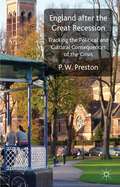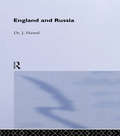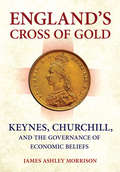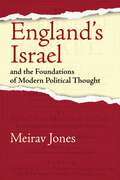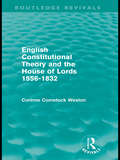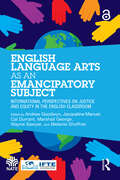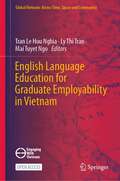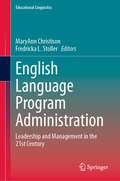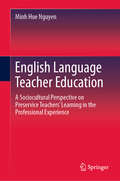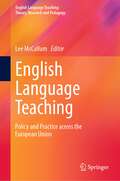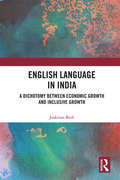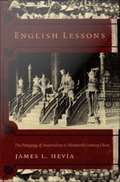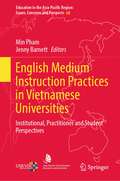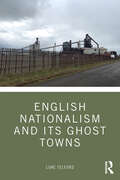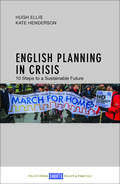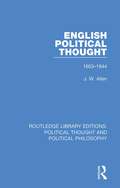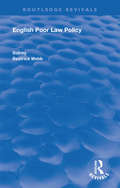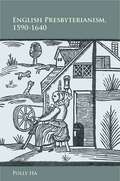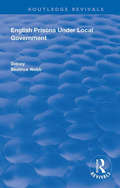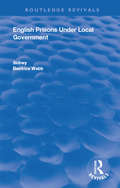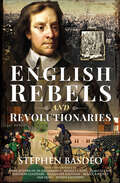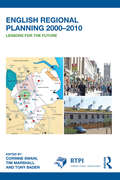- Table View
- List View
England (Enchantment of the World)
by Jean BlashfieldDescribes the geography history culture industry and people of England
England after the Great Recession
by P. W. PrestonAn exploration of the recent financial crisis which argues that the hitherto dominant intellectual and policy paradigm of neo-liberalism has been fatally weakened and will in due course be replaced. The implications of the crisis for politico-cultural identities and our sense of ourselves as members of an ordered society are explored.
England and Russia: Comprising the Voyages of John Tradescant the Elder, Sir Hugh Willoughby, Richard Chancellor, Nelson and Others, to the White
by J. HamelFirst Published in 1968. Routledge is an imprint of Taylor & Francis, an informa company.
England's Cross of Gold: Keynes, Churchill, and the Governance of Economic Beliefs (Cornell Studies in Money)
by James Ashley MorrisonIn England's Cross of Gold, James Ashley Morrison challenges the conventional view that the UK's ruinous return to gold in 1925 was inevitable. Instead, he offers a new perspective on the struggles among elites in London to define and redefine the gold standard—from the first discussions during the Great War; through the titanic ideological clash between Winston Churchill and John Maynard Keynes; to the final, ill-fated implementation of the "new gold standard."Following World War I, Churchill promised to restore the ancient English gold standard—and thus Britain's greatness. Keynes portended that this would prove to be one of the most momentous—and ill-advised—decisions in financial history. From the vicious peace settlement at Versailles to the Great Depression, the gold standard was central to the worst disasters of the time. Economically, Churchill's move exacerbated the difficulties of repairing economies shattered by war. Politically, it set countries at odds as each endeavored to amass gold, sowing the seeds of further strife.England's Cross of Gold, grounded in masterful archival research, reveals that these events turned crucially on the beliefs of a handful of pivotal policymakers. It recasts the legends of Churchill, Keynes, and their collision, and it shows that the gold standard itself was a metaphysical abstraction rooted more in mythology than material reality.
England’s Israel and the Foundations of Modern Political Thought (Jewish Culture and Contexts)
by Meirav JonesThe foundations of modern political thought, presumed secular, were laid in conversation with theologically motivated politics and in negotiation with Jewish ideasMid-seventeenth-century England was a hotbed in which crucial ideas of modern politics were conceived: Thomas Hobbes presented his social contract; John Selden wrote major treatises which were foundational for modern natural and international law; and England participated in the wave of republicanism that swept over Europe. This was also the period of the English Civil War—which has been portrayed as a “war of religion” and a “revolution of saints”—and was characterized by religious ends and motivations guiding politics and politicians.In England’s Israel and the Foundations of Modern Political Thought, Meirav Jones proposes that the foundational political theory conceived in this period was significantly related to the theological politics of the time. Through an examination of the language and imagery shared by theorists and saints, Jones finds that, in the twenty-year period between 1640 and1660, when Hobbes, Selden, and their contemporaries published, over 40 percent of all texts published in England contained one or more of the terms “Hebrew,” “Israel,” “Jerusalem,” “Zion,” or “Jew.” Further, all known works of political theory from the period employed these terms. While preachers in English parliament addressed and understood England as “Israel,” foundational theorists of the modern state employed ancient Israel as a political model and explicitly preferred Hebrew over Greek wisdom.Modern politics did not develop solely from within a conversation among elites, neither was it conceived as a Godless enterprise, even by its most renowned secular architects. Instead, as the book demonstrates, it spoke the language of religiously motivated politics and was conceived in its terms. Ultimately, Jones argues that it was through a sweeping revival of Hebrew in early modern Europe that the foundations of modern politics were laid in conversation with theological politics and in negotiation with Jewish ideas and ideas of the Jews.
English Constitutional Theory and the House of Lords 1556-1832 (Routledge Revivals)
by Corinne WestonFirst published in 1965, this work studies the House of Lords and the various proposals for its reform, abolition or limitation of its powers which have been made in the light o f prevailing theories of the nature and characteristics of the English government. The work also contains a history of the theory of mixed government that arose in Tudor England and lasted until well after the Reform Act of 1832. This history both illuminates the position of the House of Lords and also provides perspective for the study of Democracy in the movement for parliamentary reform. One of the book's most original features is an extensive account of Charles I's Answer to the Nineteen Propostions, out of which came the startling new theory of the constitution, known as "mixed monarchy".
English Language Arts as an Emancipatory Subject: International Perspectives on Justice and Equity in the English Classroom (National Association for the Teaching of English (NATE))
by Andrew GoodwynEnglish Language Arts as an Emancipatory Subject explores the changing nature and history of the English Language as an emancipatory subject, as well as how its current activities and projects address and challenge inequalities. Various forms of critical literacy have established English teaching as a radical force for social justice and subversion. However, the expert contributors to this book question whether English is a force for good in its capacity to develop literate citizens, or, are there larger contemporary complications surrounding it? This book will re-examine the history of English, its present quality as a classroom subject and its future potential to re-establish itself as an agent of social equality and change. Edited by internationally leading scholars from the UK, USA and Australia with contributions from New Zealand and Canada, this work will also inspire English teachers to view their subject as one through which positive differences are imagined, and complex real-life issues are debated and challenged in the classroom. The volume is an excellent overview of research and the latest thinking about the nature of English as an emancipatory subject, its distinguished history and its potential for the future. It will be a key resource for the research and teacher-education community, English teachers, student teachers, and anyone who views English teaching as a catalyst of social change.
English Language Education Policy in Asia
by Robert KirkpatrickThis volume offers comprehensive 'state-of-the-art' overviews of educational policies concerning the teaching of English in a large number of Asian countries. Each contribution is written by a leading expert and gives a clear assessment of current policies and future trends. Starting with a description of the English education policies in the respective countries, the contributors then delve into the 'nuts and bolts' of the English education policies and how they play out in practice in the education system, in schools, in the curriculum, and in teaching. Topics covered include the balance between the acquisition of English and the national language, political, cultural, economic and technical factors that strengthen or weaken the learning of English.
English Language Education Policy in the Middle East and North Africa
by Robert KirkpatrickThis volume offers insights on English language education policies in Middle Eastern and North African countries, through state-of-the-art reports giving clear assessments of current policies and future trends, each expertly drafted by a specialist. Each chapter contains a general description of English education polices in the respective countries, and then expands on how the local English education policies play out in practice in the education system at all levels, in the curriculum, in teaching, and in teacher training. Essays cover issues such as the balance between English and the acquisition of the national language or the Arabic language, as well as political, cultural, economic and technical elements that strengthen or weaken the learning of English. This volume is essential reading for researchers, policy makers, and teacher trainers for its invaluable insights in the role of each of the stakeholders in the implementation of policies.
English Language Education for Graduate Employability in Vietnam (Global Vietnam: Across Time, Space and Community)
by Ly Thi Tran Tran Le Huu Nghia Mai Tuyet NgoThis open access book examines the teaching and learning of English for employability in Vietnamese higher education. Its content is framed within one country to better examine the research issues within the influence of contextual factors. This book investigates how English can contribute to the development of students' employability capitals, particularly in the aspects of human capital, social capital, cultural capital, identity capital, and psychological capital. It presents employers' and employees’ perspectives of how and why English is increasingly important for career development. This book is a collection of discussions and viewpoints from teachers, students, and other stakeholders like employers, graduates, and course coordinators on current practices and their proposed improvements to prepare students for their future education, work and life. Based on empirical evidence, this book calls for repositioning English language education within the employability agenda to elevate its status and increase stakeholders' engagement. This book contributes to current debates on advancing the effectiveness of English language education in non-English speaking countries, as a response to internationalization and globalization.
English Language Program Administration: Leadership and Management in the 21st Century (Educational Linguistics #59)
by MaryAnn Christison Fredricka L. StollerThis volume provides both practicing and aspiring Language Program Administrators with knowledge about the research and theory that underpin key topics in educational leadership, as well as practical guidance for the day-to-day management of language programs, including budgets, personnel, decision making, strategic planning, advocacy, and digital technologies. The volume brings together 46 authors and contributors with a vast array of experiences as administrators of English language teaching programs all over the world—in Asia; Australia; Europe; the Middle East; New Zealand; North, Central, and South America; South Africa; Turkey; and the United Kingdom. As the need for more qualified administrators and leaders has increased, more teacher education programs have added formal courses on leadership and program administration to their offerings. Educators teaching these courses will find this volume to be an excellent core text to support students in developing their knowledge of and skills for language program administration. All chapters are connected to the contemporary realities of language program administration, and they offer practical guidance to Language Program Administrators in ways that are adaptable to different administrative contexts globally.
English Language Teacher Education: A Sociocultural Perspective on Preservice Teachers’ Learning in the Professional Experience
by Minh Hue NguyenThis book examines a range of complex issues concerning the professional experience (i.e., practicum) in English language teacher education with regard to curriculum design and implementation, as well as professional learning. Drawing on a sociocultural perspective, it explores the context of the professional experience, preservice teachers as learners of English language teaching, and the activity of learning to teach English language in connection with interrelated contextual and personal issues: contextual issues such as policies, curricula, university-school partnerships, and mentoring relations are investigated in relation to personal issues such as the beliefs, expectations, prior educational experiences, previous teaching experiences, and cultural-linguistic backgrounds of preservice teachers. In turn, the book addresses professional learning issues, including professional identity development, emotional experiences, and pedagogical learning, in depth. The book delves into the qualitative “fine-grained” aspects of the professional experience while also making valuable conceptual contributions through a sociocultural analysis of the professional learning experience, which can also be applied to research in other teacher education contexts. The findings presented here hold practical implications for English language teacher education in terms of developing a knowledge base for English language teaching and an effective model of professional experience to prepare English language teachers for working in today’s expanded, diverse and dynamic neoliberal contexts.
English Language Teaching: Policy and Practice across the European Union (English Language Teaching: Theory, Research and Pedagogy)
by Lee McCallumThis book provides an overview of current trends and practices in English Language Teaching (ELT) across the European Union. It offers insights into key ELT issues which are at the forefront of twenty-first-century classrooms. It discusses theoretical and empirical work based on topics such as linguistic imperialism, English as a Medium of Instruction, contrastive language analysis, and the interplay between English and the use of countries’ respective native languages. It also explores the challenges of English Language Teaching under different circumstances such as, while using different technological platforms, working with different learner groups (those with Special Educational Needs) and revising traditional practices in grammar and vocabulary teaching. Throughout the book, the link between policy, theory and practice is explicitly highlighted and exemplified. The book is of interest to ELT instructors, course designers, language teachers and teacher trainers, and students enrolled in pre-service English training courses.
English Language in India: A Dichotomy between Economic Growth and Inclusive Growth
by Jaskiran BediThis book examines the relationship between the English language and growth – economic and inclusive – in India. It explores why English continues to be the language of aspiration long after Independence. With the second largest English-speaking population in the world today, India is testimonial to how a linguistic legacy continues to cast a long shadow on its contemporary discourse in the economic arena. The volume: Explores how English language proficiency constitutes as human capital. Draws in the latest India Human Development Survey data. Investigates the relationship between the language and economic indicators such as wages, household income and state growth. Purther investigates the role of English language in the inclusivity of growth. Provides a snapshot of the pedagogy of English in the Indian education system. First of its kind in scope, this volume will be of great interest to scholars of economics, education, sociolinguistics, development studies, politics and sociology. It will also be of great interest to the general reader.
English Lessons: The Pedagogy of Imperialism in Nineteenth-Century China
by James L. HeviaInserting China into the history of nineteenth-century colonialism, English Lessons explores the ways that Euroamerican imperial powers humiliated the Qing monarchy and disciplined the Qing polity in the wake of multipower invasions of China in 1860 and 1900. Focusing on the processes by which Great Britain enacted a pedagogical project that was itself a form of colonization, James L. Hevia demonstrates how British actors instructed the Manchu-Chinese elite on "proper" behavior in a world dominated by multiple imperial powers. Their aim was to "bring China low" and make it a willing participant in British strategic goals in Asia. These lessons not only transformed the Qing dynasty but ultimately contributed to its destruction. Hevia analyzes British Foreign Office documents, diplomatic memoirs, auction house and museum records, nineteenth-century scholarly analyses of Chinese history and culture, campaign records, and photographs. He shows how Britain refigured its imperial project in China as a cultural endeavor through examinations of the circulation of military loot in Europe, the creation of an art history of "things Chinese," the construction of a field of knowledge about China, and the Great Game rivalry between Britain, Russia, and the Qing empire in Central Asia. In so doing, he illuminates the impact of these elements on the colonial project and the creation of a national consciousness in China.
English Medium Instruction Practices in Vietnamese Universities: Institutional, Practitioner and Student Perspectives (Education in the Asia-Pacific Region: Issues, Concerns and Prospects #68)
by Min Pham Jenny BarnettThis book focuses on English as a Medium of Instruction practices in higher education in Vietnam, addressing institutional, practitioner and student perspectives. It presents theoretical standpoints and empirical experiences of how institutional policies are enacted in the offering of English as a Medium of Instruction programs in universities in Vietnam, and how the disciplinary content is taught and learned through English. The book showcases the enactment of curricular and pedagogical practices in the classroom, drawing on a range of different disciplines central to university education. It also explores the roles of mother tongues in the construction of disciplinary knowledge in English as a Medium of Instruction programs and courses. This book provides guidance and practical information for university English as a Medium of Instruction policy makers, lecturers and student support teams in English for academic purposes across disciplines, as well as to the theoretical framing of the English as a Medium of Instruction field itself.
English Nationalism and its Ghost Towns
by Luke TelfordIn order to understand today’s nationalism, we need to address the historical decline of working-class communities, the sense of loss brought by deindustrialisation and how working-class people have been denied a voice in society and politics. Discontent has manifested strongly in these deprived post-industrial areas, often branded as communities that have been left behind under neoliberal globalisation. Whilst more and more people are voicing their discontent with a system that fails to provide social security and economic stability, many researchers have branded them merely as racists, xenophobes and ill educated. Although prejudices are likely to play a part in all political outcomes, today’s dissatisfaction across the West cannot be reduced to mere emotion and intolerance. This book therefore utilises on-the-ground research with working-class individuals in a Leave voting locale in Britain, exploring their discontent with politicians, the Labour Party, the European Union, immigration, refugees and the prolonged calls for a second referendum. It situates this sentiment towards society and politics within the decline of capitalism's post-war era and the loss of well-paid industrial jobs, increase in non-unionised service employment and the hollowing out of community spirit.
English Planning in Crisis: 10 Steps to a Sustainable Future
by Hugh Ellis Kate HendersonThe English planning system is in crisis, argue the authors of this provocative new book. Reflecting on controversial new Government reforms and deregulation, Kate Henderson and Hugh Ellis provide a comprehensive analysis of these reforms, assessing the implications and significance for the future. They highlight why planning is so essential to quality of life and set out 10 evidence-based steps to rebuild the planning system in England. Drawing on policy and practice examples from across the UK and internationally, the book is a manifesto for change. It provides a direct and vigorous challenge to the current structure and policy of planning that should ignite a debate about the values that shape its future.
English Political Thought: 1603-1644 (Routledge Library Editions: Political Thought and Political Philosophy #1)
by J. W. AllenFirst published in 1938. A study of the political doctrines and events which led to a hardening of lines between the Royalists and the Parliamentarians. "From the March of 1604, when James I met his first Parliament to the assembly of the Long Parliament in November 1640, there was going on a conflict between irreconcilable views concerning the constitution of government in England. It was concerned with what had been and with what was and, necessarily, with what should be." By 1640 the question soon would be "how stable government could ever again be established . . . But the confusion, if it produced little else of value, produced a ferment of thought." And this ferment has had an incalculable effect on the centuries which have followed. Among the many topics discussed, on the basis of firm knowledge and with reasonableness, are the King and the nature of his claim, the parliamentary opposition and its conceptions and the possibility of compromise, the approach to Toleration, Puritanism and the Laudian Church, and the final collapse of government.
English Poor Law Policy (Routledge Revivals)
by Sidney Webb Beatrice WebbFirst published in 1910, this volume is a dispassionate analysis of the changes in and the various aspects of official policy towards pauperism from the ‘Revolution of 1834’ to the Majority and Minority Reports of 1909. In their preface to this volume the Webbs wrote: "What obscured the history was the manner in which masses of heterogeneous facts were heaped together. To read, one after another, these complicated Orders and lengthy Reports, each dealing with all kinds of paupers and various methods of relief, was but to accumulate confusion. They resembled a heap of geological conglomerates which could not be assayed until they had been broken up in such a way as to sort the different materials into separate homogeneous parcels". This book succeeds in presenting a masterly survey of this sector of the British social services on the eve of the foundation of the Welfare State, and completes the corpus of the Webbs on the Poor Law.
English Presbyterianism, 1590-1640
by Polly HaThis book offers an alternative interpretation of pre-Civil War England, challenging the standard narrative that English presbyterianism was successfully extinguished from the late sixteenth century until its prominent public resurgence during the English Civil War. From their emergence in the 1570s, English presbyterians posed a threat to the Church of England, and, in 1592, the English crown arrested the leaders of the presbyterian movement. Ha shows that, during the ensuing half century of apparent silence, English presbyterians remained continually active. They made a concerted effort, for example, to build an alliance with common lawyers against episcopal authority. Yet they also sought to prove the compatibility of their church government with royal supremacy. They agitated for further reformation of the Church of England, but by the early seventeenth century they had contributed to the birth of 'independency' and to puritan appeals to neo-Roman views of liberty.
English Prisons Under Local Government (Routledge Revivals)
by Sidney Webb Beatrice WebbFirst published in 1922, in this volume Sydney and Beatrice Webb give a detailed account of the evolution of the English Prison System from the common gaol and the house of correction of the sixteenth century down to the statutory changes of the twentieth century, and survey the successive efforts at reform of John Howard and Elizabeth Fry, Jeremy Bentham and James Neild, Sir T. Fowell Buxton and J.J. Gurney. The origin and development of the cellular system, the treadwheel and the crank, the penal dietary and the "system of progressive stages" all come under review, together with the administrative changes made by Sir Edmund Du Cane and Sir Evelyn Ruggles, and the reforms during the first part of this century. In his original preface, Bernard Shaw makes a penetrating analysis of the whole theory of punishment and the incarceration of our fellow-citizens, maintaining that "Imprisonment as it exists today … is a worse crime than any of those committed by its victims; for no single criminal can be as powerful for evil, or as unrestrained in its exercise, as an organized nation". Professor Radzinowicz in a masterly new introduction surveys the development of the prison system in this century and concludes by saying of ‘English Prisons under Local Government’ that "No one can claim to understand English penology today without having read and reflected upon this book, for it imparts not only knowledge but perspective."
English Prisons Under Local Government (Routledge Revivals)
by Sidney Webb Beatrice WebbOriginally published in 1968, English Prisons Under Local Government gives a detailed account of the evolution of the English Prison System from the common gaol and the house of correction of the sixteenth century down to the statutory changes of the twentieth century, and survey the successive efforts at reform of John Howard and Elizabeth Fry, Jeremy Bentham and James Neild, Sir T. Fowell Buxton and J. J.Gurney. The origin and development of the cellular system, the treadwheel and the crank, the penal dietary and the 'system of progressive stages' all come under review, together with the administrative changes made by Sir Edmund Du Cane and Sir Evelyn Ruggles, and the reforms during the first part of the 20th century.
English Rebels and Revolutionaries
by Stephen BasdeoThroughout history brave Englishmen and women have never been afraid to rise up against their unjust rulers and demand their rights. Barely a century has gone by without England being witness to a major uprising against the government of the day, often resulting in a fundamental change to the constitution. This book is a collection of biographies, written by experts in their field, of the lives and deeds of famous English freedom fighters, rebels, and democrats who have had a major impact on history. Featured chapters include the history of Wat Tyler’s Rebellion, when an army of 50,000 people marched to London in 1381 to demand an end to serfdom and the hated poll tax. Alongside Wat Tyler in this pantheon of English revolutionaries is Jack Cade who in 1450 led an angry mob to London to protest against government corruption. There are three chapters on various aspects of the English Civil War, during which the English executed their king. Other rebel heroes featured include Thomas Paine, the great intellectual of the American and French Revolutions; Mary Wollstonecraft, author of The Rights of Woman; Henry Hunt, who, as well as the Chartists after him, campaigned for universal suffrage; William Morris, the visionary designer and socialist thinker; and finally the Suffragettes and Suffragists who fought for women’s voting rights.
English Regional Planning 2000-2010: Lessons for the Future (RTPI Library Series)
by Tim Marshall Corinne Swain Tony BadenEnglish Regional Planning 2000-2010 chronicles a vital feature of recent UK planning activity, during the period of the Blair and Brown Labour governments up to 2010. It deals particularly with the regional scale of planning during these years, whereby large steps forward were made, but where policy making often proved very controversial. One purpose of the book is to learn from the many areas of policy development, method and skills which evolved during the decade up to 2010. This will mean that a future return to strategic planning should not have to reinvent the wheel. This book also helps to inform such planning in the rest of the developed world where higher-level planning is more prevalent. The book has eight chapters written by experts active in English regional planning during these years, alongside two chapters by the editors introducing and concluding on the experience as a whole. Thematic topics covered include the way in which housing and employment development was tackled in the varying English regional contexts, and the growing influence of transport and environmental factors on the spatial strategy. Process elements covered include how policy was made through public consultation and working with numerous stakeholders (economic, social, environmental), how the public examination of issues was organised, followed by final consideration by central government, and how monitoring informed the next policy review. The authors do not gloss over the difficulties encountered in the highly contested world of English local and regional politics, or the ways in which central government management of the regional planning process made life on the ground difficult for those engaged in the process. Nevertheless the account as a whole shows how a wealth of innovative and forward looking practices were developed. This multi-faceted study contributes to the understanding of how strategic planning can provide the framework for guiding spatial change and allocating resources, looking to a long-term sustainable future.

